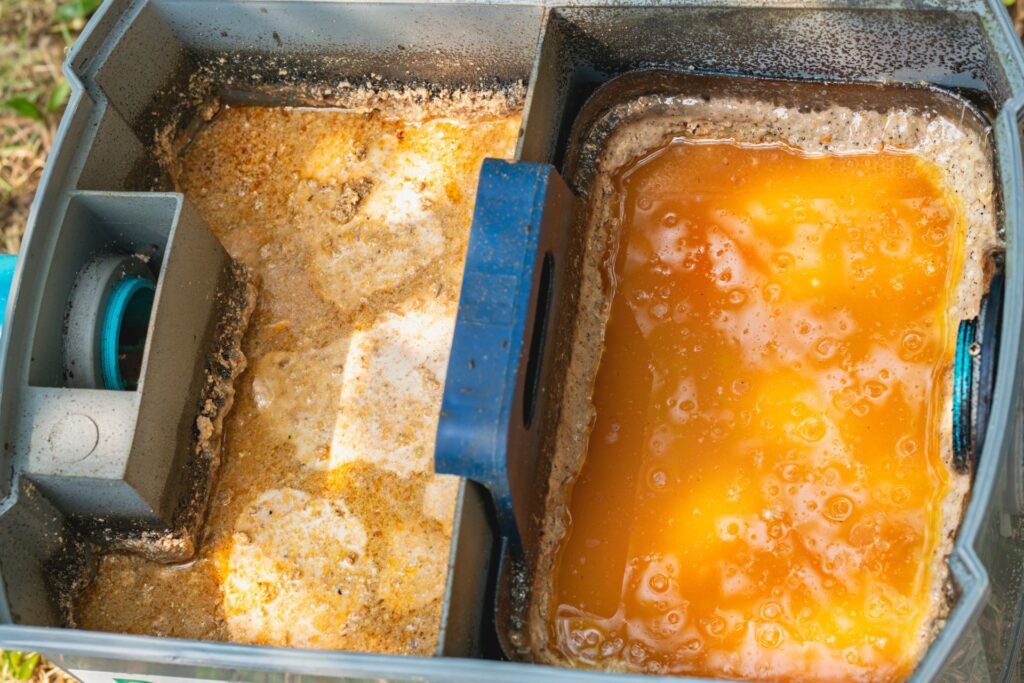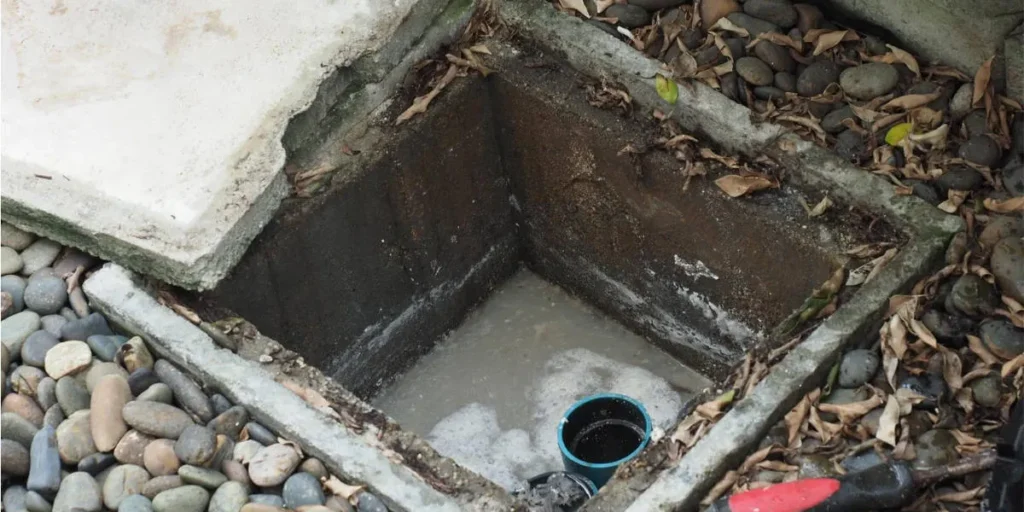How to Get Rid of Grease Trap Smell – Don’t Miss These Fixes
Grease trap smells can quickly take over your kitchen or business, making the space unpleasant. If you’re noticing foul odors, it’s usually a sign something’s off.
The good news? You can fix it. In this guide, we’ll walk through simple, effective ways to get rid of grease trap smells for good—especially with the help of professional Pompano Beach grease trap cleaning services that ensure thorough and lasting results.
How to get rid of grease trap smell?
To get rid of grease trap smell, clean the trap, flush with hot water and vinegar, seal the lid tight, and maintain proper ventilation.
Key Takeaways:
- Grease trap smells come from built-up fats, oils, grease, and food waste.
- Regular cleaning is the most effective way to prevent odors.
- Baking soda and vinegar offer a quick natural fix.
- Sealing the lid and ensuring proper ventilation helps reduce smells.
- Grease trap additives and professional cleanings can keep things fresh long term.
What Causes Grease Trap Smell?

1. Built-up grease and food sludge
Grease traps collect all the leftovers your sink doesn’t want to deal with—oil, scraps, and all the funky bits. Over time, this gunk builds up and starts to rot. And yeah, it smells exactly like it sounds.
2. Blocked or dirty inlet/outlet pipes
If the pipes going in or out of your trap are clogged, waste hangs around longer than it should. That backup creates a perfect little stink-factory under your sink.
3. Dry water seal
Some grease traps use a water barrier to block odors. If that dries out—say you haven’t used the sink in a while—nothing’s stopping the smell from sneaking into your space.
4. Bacterial imbalance
Not all bacteria are bad. The right kind helps break down waste. But if your trap isn’t cleaned regularly, the good guys bail and the stink-makers move in.
5. Cracked or poorly sealed lids
Even if everything else is working, a loose or cracked lid can let those gnarly smells out. It’s like spraying cologne on a trash can and hoping for the best.
Solution: Clean your trap regularly, check the P-trap, and ensure good airflow. It keeps smells down and your system running smoothly.
Immediate Steps to Eliminate Grease Trap Odor
1. Flush with Hot Water and Dish Soap
Start by pouring a pot of hot water mixed with grease-cutting dish soap down the sink. This helps loosen built-up grease and clear minor clogs.
2. Use a Natural Deodorizer
Baking soda and vinegar can help. Pour half a cup of baking soda followed by a cup of vinegar into the drain. Let it fizz for 10-15 minutes, then flush with hot water.
3. Empty the Trap if It’s Full
If the trap hasn’t been cleaned recently, it’s probably overdue. Remove the lid and pump or scoop out the contents. Be sure to dispose of the waste properly.
4. Clean the Interior Surfaces
Use a scraper or brush to clean grease off the trap walls and baffles. A degreasing solution can make this easier and help reduce lingering smells.
5. Seal the Lid Tight
After cleaning, double-check the lid is sealed properly. Loose or broken seals can let odors escape even when the trap is clean.
Long-Term Solutions to Prevent Grease Trap Smell
1. Stick to a Cleaning Schedule
The biggest mistake? Waiting too long to clean your grease trap. Set a regular cleaning schedule—monthly or quarterly, depending on usage. This keeps buildup in check and odors at bay.
2. Install a Grease Trap Additive System
Some systems automatically release enzymes or bacteria that break down grease. It’s a low-effort way to stay ahead of the smell. These systems help between manual cleanings.
3. Train Staff on What Not to Dump
Don’t let food scraps, coffee grounds, or dairy go down the drain. Grease traps aren’t made for everything. A quick training session can go a long way in preventing future problems.
4. Check for Ventilation Issues
Poor airflow can trap odors and make them worse. Make sure vents aren’t clogged or damaged. Good ventilation helps keep the kitchen or work area fresh.
5. Schedule Professional Inspections
Even with regular maintenance, a pro can spot what you might miss. Annual inspections help catch hidden issues early. It’s worth it for peace of mind and a stink-free space.
Compliance and Health Considerations

1. Health Risks from Odor
A strong grease trap smell isn’t just unpleasant—it can affect indoor air quality and cause headaches or nausea. It may also signal harmful bacteria buildup that could impact your team’s health. Regular cleaning and maintenance are essential to prevent these issues. For affordable interceptor cleaning in Miami, it’s important to hire professionals who can ensure that your grease traps are properly cleaned and maintained, helping to avoid both health hazards and unpleasant odors.
2. Local Regulations Matter
Many cities have health codes that require regular grease trap cleaning. Ignoring them can lead to fines or even temporary closure.
3. How to Stay Compliant
Stick to a set maintenance schedule and keep service records. Use certified professionals for cleaning and inspections to meet health department standards.
4. Take Preventive Steps
Install proper ventilation and make sure your trap is the right size for your kitchen’s volume. Staying proactive keeps both inspectors and staff happy.
Final Tips to Keep Grease Trap Odor-Free
Keep it simple—stick to a regular cleaning schedule and don’t let grease sit around too long. Scrape plates and pans before washing to cut down on buildup. Add enzyme-based cleaners to your routine once or twice a week. For those in Pembroke Pines, using top-rated interceptor cleaners can significantly improve grease management and prevent clogs in your system. These cleaners are designed to effectively break down grease and waste, keeping your kitchen drains running smoothly.
They’re like a gut cleanse for your grease trap—quietly doing the dirty work. If you’ve ever wondered what is a grease interceptor, it’s essentially the unsung hero catching fats, oils, and grease before they hit your plumbing. And don’t forget to check the seals and lids. If they’re loose, smells will sneak out like bad vibes at a dinner party. Stay consistent, and you’ll keep things smelling fresh without breaking a sweat.
Frequently Asked Questions
1. How Can I Prevent Grease Trap Smell?
Regular cleaning and maintenance are key. Empty your grease trap every 1-3 months to prevent odors from building up. You can also use enzyme-based cleaners to break down grease.
2. What Are the Common Causes of Grease Trap Odor?
The main causes are grease buildup and food particles that decompose inside the trap. If left untreated, these materials start to rot, releasing foul smells.
3. Can I Use Natural Remedies for Odor Control?
Yes! Pouring a mixture of vinegar and baking soda into the grease trap can help neutralize odors. This natural method is safe and effective for reducing smell between cleanings.
Conclusion
Dealing with a smelly grease trap doesn’t have to be a hassle. Regular cleaning and maintenance are key to preventing unpleasant odors. Using natural deodorizers like baking soda or vinegar can also help. For more severe cases, consider professional grease trap cleaning services. Staying on top of your grease trap’s health will ensure a fresher-smelling environment and avoid costly repairs down the road.
